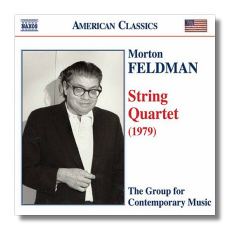
The Internet's Premier Classical Music Source
Related Links
- Feldman Reviews
- Latest Reviews
- More Reviews
-
By Composer
-
Collections
DVD & Blu-ray
Books
Concert Reviews
Articles/Interviews
Software
Audio
Search Amazon
Recommended Links
Site News
 CD Review
CD Review
"It's life, Jim, but not as we know it." That catch-phrase from the old Star Trek TV series applies to Morton Feldman's String Quartet (1979) rather well. Indeed, to hear it attentively is to confront something alien – something that asks us to meet it on its home planet and not ours. In fact, Feldman, when discussing what led up to his writing the String Quartet the way that he did, used the analogy of "watching some bugs on a slide, and […] just watching how I feel."
The String Quartet ushered in a period in which Feldman experimented with so-called "long pieces." Compared to later works from this period, the single-movement String Quartet is rather terse; much longer ones were to follow. (Wags might refer to it as a "no movement" work, however.) Originally, the Quartet received the Cage-like nickname of "100 Minutes" – an allusion to the length of the performance at the 1980 première. That the Group for Contemporary Music's performance is some twenty percent shorter should not be a source of concern. What Feldman was aiming for, it appears, was a piece that would alter one's perception of time, and (again) for the attentive listener, the String Quartet does just that.
So what does it sound like? It is mostly quiet – the musicians play using mutes throughout – and almost completely unhurried in its progress. Feldman's strategy is to create a little "quantum" of several notes, and then to repeat it, vary it, and move on to the next quantum. Sometimes an idea heard earlier will return as a sort of refrain, and when it does, it is much more of a "hmmm" moment than an "A-ha!" (For me, anyway, "A-ha!" moments are rare in Feldman's music, but I suppose one man's "hmmm" is another man's "A-ha!") Of melody in the usual sense there is none, although the work's chromaticism is quickly heard. Individual notes or chords often appear one at a time, as if Feldman were a poker player in no hurry to reveal his entire hand. This gives the music a pointillist feel. Pulse, when it is felt, is intermittent and prone to vary. At first the music seems emotionless, but as one comes to accept that the String Quartet may in fact be "life, but not as we know it," drama reveals itself in the music's dogged moments of insistence, awkward conversations, temporary alliances, and unusual timbres. Petulance, whining, nagging, stoicism, acceptance, beauty, and peace all are present in this work, for those who care to find them.
This is a reissue of a recording originally released by Koch International Classics in 1994. Back then, the performance seemed if not definitive, then at least totally satisfying, and I have no reason to revise that opinion now. Douglas Cohen's original booklet notes have been retained for this reissue.
An ear-stretching experience to be sure, but one well worth having.
Copyright © 2006, Raymond Tuttle





















